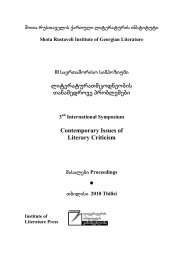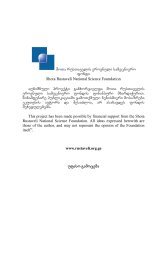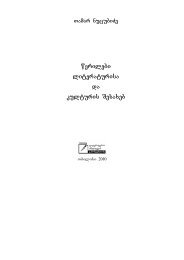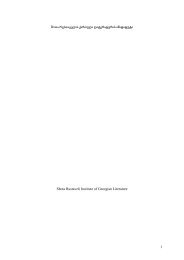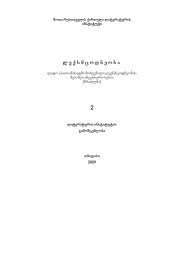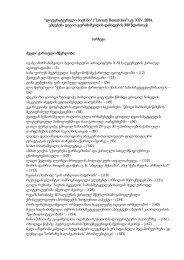Shota Rustaveli Institute of Georgian Literature
Shota Rustaveli Institute of Georgian Literature
Shota Rustaveli Institute of Georgian Literature
You also want an ePaper? Increase the reach of your titles
YUMPU automatically turns print PDFs into web optimized ePapers that Google loves.
patterns <strong>of</strong> the perceived winner, in line with the Communication Accommodation Theory (CAT) developed by<br />
Howard Giles (see for example, Giles and Smith, 1979). This theory represents a broad set <strong>of</strong> linguistic and extralinguistic<br />
signals which enable us to adapt our communicative acts to those <strong>of</strong> our partners, shifting them along a<br />
convergent or divergent direction in the sequence <strong>of</strong> exchange.<br />
However, there is a logical objection to the use <strong>of</strong> PC: some men do not approve <strong>of</strong> the fact that “men only”<br />
meetings, unlike “women only” meetings, are taboo. Hence, using PC language is a Catch-22 situation – if you do it, it<br />
means that you are painfully aware <strong>of</strong> the differences between you and the pc-ed concept and either disapprove or<br />
pretend to disapprove. And if you don’t, you are a racist, a rankist, or a male chauvinist. At the same time, it is always<br />
a moot point, whether you say what you think, pretend to do so, or are keen to pretend nothing is wrong. Semantic<br />
bleaching <strong>of</strong>ten dilutes political correctness statements, thus conjuring up the well-known words by Baudrillard that<br />
the meaning is eroded via its excess.<br />
In his seminal book Modernity and Self-Identity Anthony Giddens refers to consumer capitalism and its<br />
efforts to standardize consumption and to shape tastes through advertising and to new ‘paternalism’ in which experts<br />
<strong>of</strong> all types minister to the needs <strong>of</strong> the lay population (Giddens, 1994). Consequently, in conclusion I’d like to state<br />
that the political correctness is a way <strong>of</strong> shaping attitudes within the context <strong>of</strong> this new ‘paternalism’ which can only<br />
be achieved provided a degree <strong>of</strong> trust is generated in the ‘lay population’ by the western experts, As recipients and<br />
developers <strong>of</strong> the new code we in Eastern Europe are supposed to trust the new shared discourse which reflects<br />
standardized and globalized language. The world <strong>of</strong> the market is full <strong>of</strong> the “language <strong>of</strong> lies” and to get to the<br />
meaning behind this language <strong>of</strong> lies we need a new grammar <strong>of</strong> communication. Pc is an essential part <strong>of</strong> it. Since<br />
expertise and transaction are the determinants <strong>of</strong> the modern world which is increasingly becoming pr<strong>of</strong>essional<br />
(Moscovici), and expert-oriented (Giddens) – the new code makes the minds easier to control.<br />
Pc is a strategy used to preserve personal images mutually, achieve a symmetry within relationships by hiding<br />
(revealingly) any real or perceived inequality. It is an essential part <strong>of</strong> a new grammar <strong>of</strong> communication with its<br />
underlying structure <strong>of</strong> wishful thinking; a new post-modernist discourse, poly-semic in the Bakhtinian sense – it both<br />
reveals and hides one’s ideology simultaneously, i.e. it is the Mouth Wide Shut phenomenon.<br />
Bibliography:<br />
Barthes 1957: Barthes, R. “Mythologies“, Editions du Seul, 1957<br />
Berman 2001: Berman, M. “The Twilight <strong>of</strong> American Culture”, NY, 2001, 29<br />
Chomsky 2000: Chomsky, N. “Rogue States, the Rule <strong>of</strong> Force in World Affairs” .South End Press, Cambridge, 2000<br />
Dunkerley et al, 2002: Dunkerley, K. et al. “Similarities and Differences in Perceptions and Evaluations if the Communication<br />
Styles <strong>of</strong> American and British Managers”, Journal <strong>of</strong> Language and Social Psychology. Vol.21, No.4, 2002, p. 407<br />
Fay 1996: Fay, B. Contemporary Philosophy <strong>of</strong> Social Science: A Multicultural Approach, Oxford: Blackwell, 1996, p.59<br />
Fillmore 1984: Fillmore, C. “Remarks on Contrastive Pragmatics” in J.Fisiak (ed.) Contrastive Linguistics: Prospects and Problem.<br />
Berlin: Mouton, 1984, p. 129-130<br />
Findlay 1998: Findlay, M. “Language and Communication”. ABC CLIO, Santa Barbara, 1998, p.50<br />
Giddens 1994: Giddens, A. “Modernity and Self-Identity. Self and Society in the Late Modern Age”, Cambridge: Polity Press,<br />
1994, p. 172-174<br />
Giles and Smith 1979: Giles, H. and P.M.Smith. “Accommodation Theory: Optimal Levels <strong>of</strong> Convergence’ in Giles, H. and<br />
R..St.Clair (eds). Language and Social Psychology. Oxford: Basil Blackwell, 1979<br />
Grice 1999: Grice, H.P. ”Logic and Conversation”, in Adam Jaworski and Nikolas Coupland (eds.) The Discourse Reader. London:<br />
Routledge, 1999, 76-88<br />
Hall 1981: Hall, E.T. The Silent Language. New York: Anchor, 1981<br />
H<strong>of</strong>stede 1997: H<strong>of</strong>stede Geert “Cultures and Organisations. S<strong>of</strong>tware <strong>of</strong> the Mind. New York: McGraw-Hill, 1997<br />
Lak<strong>of</strong>f 1975: Lak<strong>of</strong>f, R. “Language and Woman’s Place”. New York: Harper and Row, 1975<br />
Lak<strong>of</strong>f R 2001: Lak<strong>of</strong>f R. “The Language War”, University <strong>of</strong> California Press, Berkeley and LA, 2001<br />
Levi Strauss 1962: Levi Strauss, C.” La Pensee sauvage”, Paris 1962<br />
LDECL: Longman Dictionary <strong>of</strong> English Language and Culture (Addison Wesley Longman, 1998<br />
OPCDH: The Official Politically Correct Dictionary and Handbook (OPCDH ) by Henry Beard and Christopher Cerf . London:<br />
Grafton, 1992<br />
Outhart et al 2000: Outhart, I et al. Travel and Tourism. Marvell Collins, 2000<br />
Pei 1973: Pei, M. Doublespeak in America. Hawthorn Books, 1973<br />
Perianova 2002: Perianova, I.”Discourse and the Language <strong>of</strong> Avoidance”, Foreign Language Teaching, No.4, 2002, S<strong>of</strong>ia<br />
Storti, 2001: Storti, C. “Old World, New World”, Yarmouth: Intercultural Press, 2001<br />
Stewart et al., 1998: Stewart E., J.Danelian and R.Foster. “Cultural Assumptions and Values”. In Basic Concepts <strong>of</strong> Intercultural<br />
Communication. Intercultural Press, Boston –London 1998, 161<br />
Trompenaars and Hampden–Turner,1997: Fons Trompenaars, F. and Ch. Hampden-Turner “Riding the Waves <strong>of</strong> Culture:<br />
Understanding Diversity in Global Business” New York: McGraw-Hill 1998<br />
Tannen 1990: Tannen D. “You Just don’t Understand. Men and Women in Conversation”, New York: W.Morrow and Company,<br />
1990<br />
Tweedie, 2005: Tweedie, N. ”Hype-inflation <strong>of</strong> English”.<br />
Http://portal.telegraph.co.uk/core/content/displayPrintable.jhtml?xml=global/2005/<br />
Димитрова,1999: Димитрова Ст. “Езикова демагогия”, София: Наука и изкуство, 1999.<br />
121



